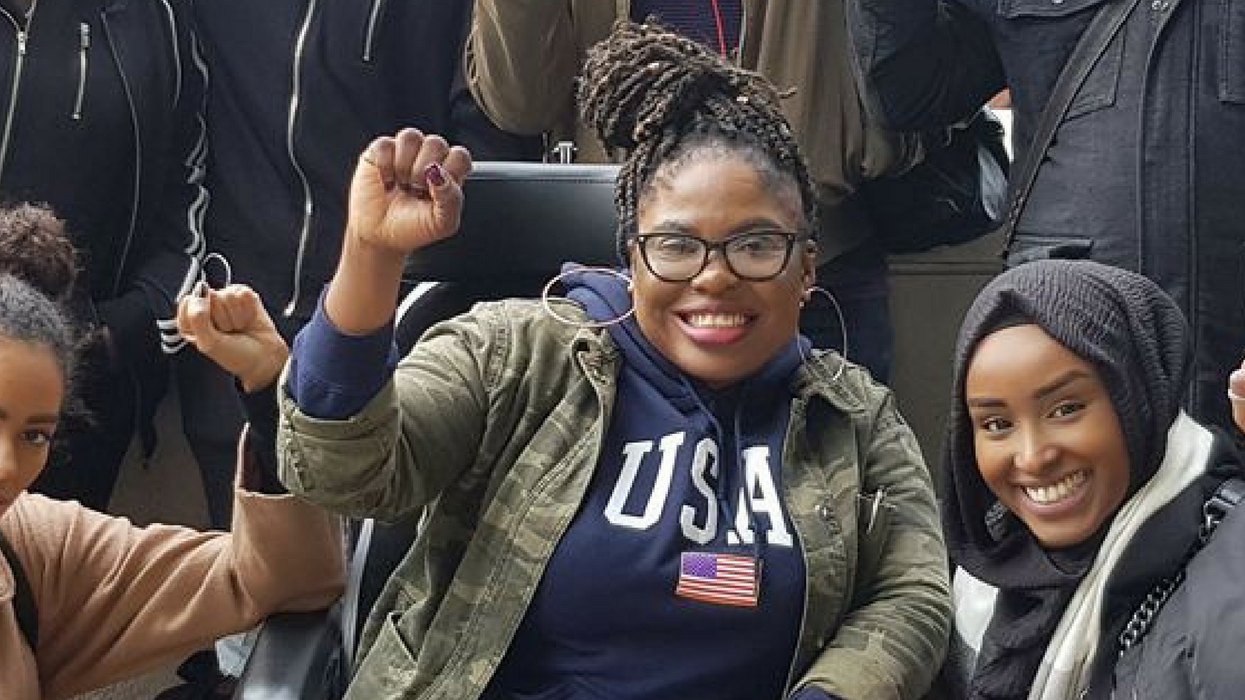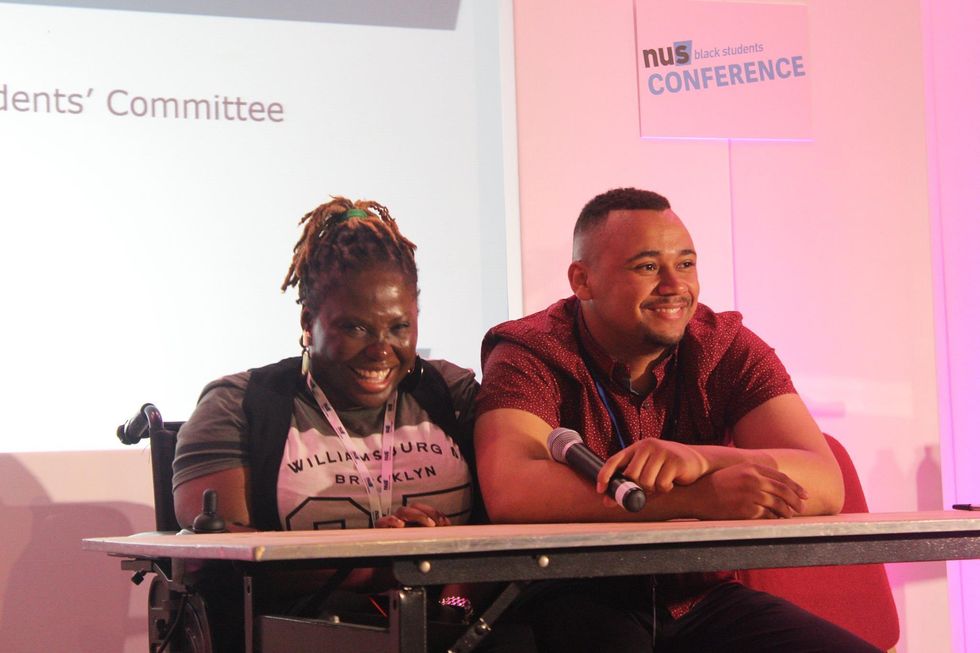News
Darin Graham
Feb 27, 2018

Picture:
Kelechi Chioba
A disabled LGBT+ activist from Nigeria who was beaten, abused and labelled a "curse" by her own family has been granted asylum after a groundswell of online support.
37-year-old Kelechi Chioba – who suffers from polio and mental health issues – first sought asylum in Britain on the basis that she endured severe abuse due to her disability. But her original application was denied by the Home Office.
They told her there was “nothing sufficiently serious in the family or private life circumstances that could possibly outweigh the need for immigration controls to be enforced".
But that didn’t stop her.
Kelechi got new legal representation after a Home Office attempt to detain her. As she defines herself as bisexual, Kelechi put in a new plea on the basis of her sexuality. This was accepted and the Home Office granted her asylum on 9 February.
When she lived in Nigeria, a country lacking rights for LGBT+ people and where in some areas same-sex activity is illegal and punishable by death, she never openly discussed her sexuality. She would instead have secret affairs with women.
Now, she tells indy100 about the journey she has undertaken to finally be granted asylum and the very real issues facing both LGBT+ people and people with disabilities in Nigeria.
What went through your mind when your initial asylum plea was rejected?
Fear that I am going back to the abuse I ran away from; fear of being killed, and fear that I will be victimised because of my sexuality and activism knowing that it's a taboo in my country.
And when the second one succeeded, how did you feel?
Wow, I couldn't believe it I thought I was in a dream. The statement that came out from my mouth was, 'It's finally over.'
I can finally say all the abuse is in my past and with no fear of going back to it.
Finally, I feel I'm 100 percent safe to continue my activism as a bisexual and inspiring more black people in accepting who they are.
More than 2,000 people signed petitions supporting you. How do you feel about this response?
First of all, I feel blessed that people believed in me. I believe I'm loved, it makes me agree that most people still agree to equality and fair treatment, and stand against oppression and discrimination among the vulnerable. This proves to me the strength of unity, activism and campaigning.
What are the main issues facing other disabled people in Nigeria right now?
Disability is considered a taboo in Nigeria. So as a disabled person in Nigeria you face issues like: inaccessibility, lack of benefits system put in place to assist them.
Discrimination and inequality they experience in every aspect of their lives.
Most of them are tortured to death by their family.
No implemented laws put in place to secure them.
Most of them can't afford to get educated because people around and family consider it as a waste of money.
Most of them are sexually abused and used for rituals.
From your experience, what are the services like for disabled people in Nigeria? What kind of support structures are in place? Do they have disabled facilities? Is there a difference in provision in metropolitan and rural areas?
There's no services or support for disabled people in Nigeria, actually, it is survival of the fittest for them. Since there's no implemented law on accessible structure and environment. We had to struggle to use toilets, climb staircases and access buildings. There's no difference between the urban and the rural.
What work do you think needs to be done in communities where people believe disabilities are a 'curse'? What should the government and authorities in Nigeria be doing?
First of all, there should be an enlightenment, informal education to break the stigma. The people of the community should be taught that 'disability' does not mean you've sinned against the gods and that is your punishment. They should be taught that disability is an impairment or a disease, not a curse.
The government and the authorities have a role to play which is to develop an implemented laws and regulation against discrimination. Set up accessible structures and facilities and ensure that there is a benefit system set in place for them.
Over the years, how do you feel you have been treated by the UK Home Office?
I will say dreadful, some might say they were doing their job. That might be true but subjecting me to all those stress which impacted immensely on my mental health was not good at all.
At what point did you enter National Asylum Support Service (NASS) accommodation and can you tell us about your experience there? What was it like in the accommodation?
When I became homeless, I was put into a NASS accommodation. To be truthful it's good, and I really liked it, though it doesn't really suit my accessibility needs. But the social services did their best to meet my needs.
When you're being allocated an accommodation, you will also be allocated a housing officer who inspects the flat once every month and ensures that you are comfortable. You are given conditions to live there like no pets, no subletting etc.
What are some of the things your parents said to you?
'I shouldn't be born, I'm a curse, I'm a cross, I'm useless, I will never amount to anything, I will only be a sex object to men.'
Through this whole ordeal, everything you’ve been through over the last few years – what moment stands out to you?
The moment I stood and said to myself, 'Enough is enough. I need to run away to save myself.' That was when I came to the UK and smelt freedom. And when I was told I've been granted asylum.

What gave you hope along the way?
NUS trained me to believe in myself through activism, through campaigning and inspiring others – that gave me hope.
My friends, my faith and belief, SaveKelechiCampaign, everyone involved, organisations in Derby and all over UK, savelordcampaign, Black Student Campaign, Disabled Student Campaign, Justice for Sanaz Campaign, and so much more.
What inspires you in your activism?
Passion.
What were your first impressions of Britain, when you arrived?
A civilised country.
Are you family aware of what you are going through right now?
I don't know, now it's on Facebook. They might know or not know.
If you could give one message to Theresa May now your asylum has been accepted, what would it be?
Thank you, Theresa May, for granting me my freedom and I hope this good work will be extended to other immigrants.
Kelechi's health has deteriorated over the course of her asylum process and she is now recovering from major surgery at Royal Derby Hospital.
Now she has been granted asylum, she hopes to continue in her studies in hospital and health – which she was forced to postpone.
indy100 has contacted the Home Office for comment.
Top 100
The Conversation (0)













